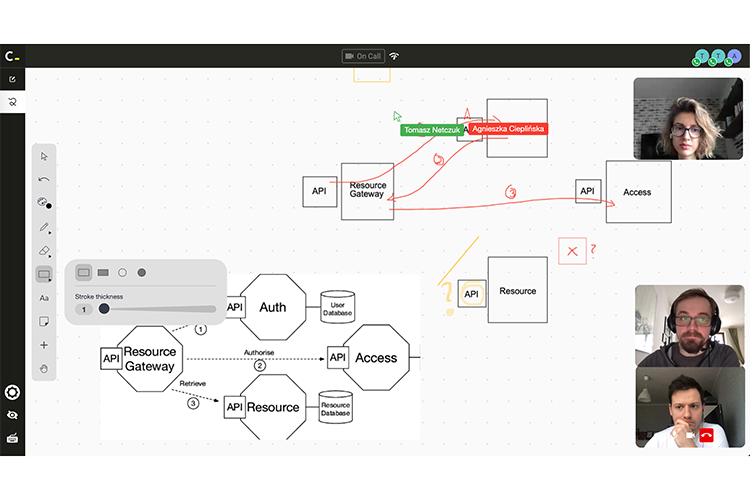Be the first to know
Sign up for a weekly dose of tech hiring news and updates.
With the rise of remote work, virtual whiteboard tests are becoming increasingly important for companies to assess developers’ technical and communication skills.
However, these interviews don’t have the best reputation among developers because they’re typically conducted under unrealistic conditions. But this is where virtual technical interviews score: you can work at your computer, in a familiar environment, and often in a code editor. In addition, if the interviewer uses a tool like CodeLive, you also have other features at your disposal that enhance the interview experience for both sides.
As a senior frontend engineer, I have had the opportunity to interview developers and have been a candidate in many programming interviews myself. As a result, I understand the pros and cons of whiteboard interviews and how taxing they can be.
So in this article, I’d like to give you some tips on how to master these virtual interviews and have a better experience.
Know what kind of questions to prepare
Interviewers expect you to be knowledgeable in your field, but they don’t expect you to know everything by heart, especially things that aren’t role-specific. Therefore, when preparing for technical interview questions, consider questions related to your area of expertise and the “classics.”
Many companies now prefer to ask real-world questions relevant to the job. It seems to be catching on that it’s more critical for a frontend engineer, for example, to be able to solve programming questions on topics such as UI implementation than it is to be able to write the Bubble Sort Algorithm on a whiteboard.
If you like this, you’ll love: How to prepare for a virtual whiteboard interview
However, many recruiters find it more practical to ask “classic” computer science questions, especially when they have many applicants to evaluate. These include questions about data structures, popular programming problems, and the algorithms you can use to solve them.
But don’t worry, in my experience, interviewers don’t expect you to memorize these algorithms, but you should know that they exist and what they do.
In general, it’s essential to be able to come up with a solution, justify your approach, talk about tradeoffs, and discuss how to optimize your code. These things are much more interesting to a company than your ability to memorize code.

Think of relevant experience for the job
Interviewers are also always interested in learning about your real-world experience, whether it’s your role in previous jobs or your work on open-source projects. My favorite questions for candidates are the ones where I ask them to share knowledge and experience they could never learn in a book or tutorial.
However, you may not come up with anything valuable at the technical interview right off the bat, which is why preparation is crucial. Thus, take a close look at the job description before the programming interview and consider your relevant experience.
Let’s say you’re a frontend developer, and the job description says something like, “We’re looking for a frontend engineer who has experience with React and state management libraries like Redux.” Instead of just thinking, “Yes, I’ve worked with both,” think of specific examples and experiences you could share:
- What problems have you encountered?
- How did you and your team solve them?
- What role did you play in finding a solution?
- Why did you decide to do things a certain way?
Coding practice pays off
As I mentioned earlier, you don’t need to know everything or be able to provide the right solution to a programming problem right away. Instead, break down the problem and work your way to a solution. If you don’t feel confident doing this, you need to practice.
Interviewers pay particular attention to how a developer approaches a programming problem and how they handle feedback and questions. Practice solving challenges regularly and talk out loud as you do so. Following a specific process can also be helpful – this is how I approach a programming problem:
- Identify the main problem and any other relevant problems that might arise
- Gather all the necessary information to be able to solve the problem (ask the right questions)
- Break the big problem into smaller parts
- Solve these sub-problems without losing sight of the big picture
- Request feedback and engage in discussions about my solution
Practice is key here; luckily, you’ll find plenty of material online to help you prepare. For example, visit the Codility Developer Training app, where you can find coding practice exercises and fun challenges.
Extra reading: How to prepare for technical interview – essential tips
Hone your soft skills
Most developers work as part of a team in a company that values teamwork and employee well-being through healthy connections. So job interviewers want to see if you fit into the company culture and therefore need to assess your soft skills.
By sharing your thoughts and discussing your solution and approach with the interviewer, they learn about your communication skills and your ability to give and receive feedback. You can practice whiteboard tests with a friend or film yourself. It may feel strange, but the outside perspective can help you see what you could be doing better. For me, it’s also always been inspiring to watch videos of someone showing how they solve a problem.
I also recommend showing interest in the company and the job, which is an excellent opportunity to demonstrate your soft skills. Most interviewers will allow you some time at the end of the programming interview to ask questions, and it looks best if you actually have questions to ask.
Practicing for your next virtual whiteboard test
I hope my tips and insights in this article were able to help you get a clearer view of technical interviews and give you some ideas on how to prepare.
So before your next virtual whiteboard test, brush up on your technical skills, look for coding practice, train your brain to approach complex problems, and get assistance online or from friends.
Want more tips on preparing for a coding interview? Check out Codility Developer Training – an app where you can develop your coding skills with our lessons and participate in our challenges.
